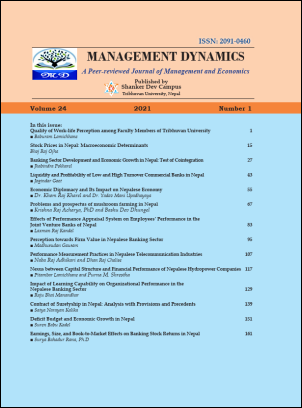Quality of Work-life Perception among Faculty Members of Tribhuvan University
DOI:
https://doi.org/10.3126/md.v24i1.47537Keywords:
autonomy of the work, fair compensation, QWL, relation and cooperation, work environmentAbstract
A quality teaching staff is the foundation of a successful educational system. For the development of quality teaching, faculty attention has to be paid to their QWL to confirm their job satisfaction and commitment to their University. It is a common conviction that the QWL of faculties largely depends upon the quality of the people one works with, assisting colleagues in the workplace, the salary structure of an organization, the nature of work, provision for respect, and achievement. But there are some other significant dimensions of QWL, such as the autonomy of the work, relation, cooperation, fair and adequate compensation, and work environment, which also have an impact. Therefore, the present study aimed to investigate the perceptual difference in QWL among teaching faculty of universities. The data were collected from full-time academicians working on selected campuses in the Pokhara Valley. A structured Google form questionnaire was used to gather the data. Four hundred questionnaires were distributed, out of which only 204 questionnaires were found to be complete and usable for the analysis. Data were analyzed using SPSS, in which a one-way ANOVA test. The findings of the study pointed out that there is no perceptual difference in QWL among university professors, associated professors, and lecturers. They will serve as valuable inputs for the universities in identifying the key workplace issues to develop strategies to address and improve the quality of working conditions and raise the quality of work-life of the faculty members in their universities.
Downloads
Downloads
Published
How to Cite
Issue
Section
License
Copyright © Research Management Cell, Shanker Dev Campus

